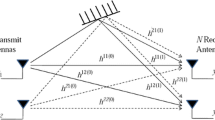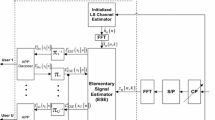Abstract
In this paper, we present computationally efficient iterative channel estimation algorithms for Turbo equalizer-based communication receiver. Least Mean Square (LMS) and Recursive least Square (RLS) algorithms have been widely used for updating of various filters used in communication systems. However, LMS algorithm, though very simple, suffers from a relatively slow and data dependent convergence behaviour; while RLS algorithm, with its fast convergence rate, finds little application in practical systems due to its computational complexity. Variants of LMS algorithm, Variable Step Size Normalized LMS (VSSNLMS) and Multiple Variable Step Size Normalized LMS algorithms, are employed through simulation for updating of channel estimates for turbo equalization in this paper. Results based on the combination of turbo equalizer with convolutional code as well as with turbo codes alongside with iterative channel estimation algorithms are presented. The simulation results for different normalized fade rates show how the proposed channel estimation based-algorithms outperformed the LMS algorithm and performed closely to the well known Recursive least square (RLS)-based channel estimation algorithm.
Similar content being viewed by others
References
Berrou, C., Glavieus, A., & Thitimajshima, P. (1993). Near Shannon limit error correcting coding and decoding: Turbo-codes. In IEEE International Conference on Communications (pp. 1064–1070).
Berrous C., Glavieux A. (1996) Near optimum error correcting coding and decoding: Turbo codes. IEEE Transactions on Communications 44: , 1261–1271
Douillard C., Jézéquel M., Berrou C., Picart A., Didier P., Glavieux A. (1995) Iterative correction of intersymbol interference: Turbo- equalization. European Transactions on Telecommunications 6: 507–511
Proakis J.G. (1995) communications, 3rd edn. McGraw-Hill, New York
Tuchler M., Koetter R., Singer A.C. (2002) Turbo equalization: Principles and new results unknown. IEEE Transactions on Communications 50: 754–767
Otnes R., Tuchler M. (2004) Iterative channel estimation for turbo equalization of time varying frequency selective channel. IEEE Transactions on Communications 3(6): 1918–1923
Otnes, R., & Tuchler, M. (2002). Soft iterative channel estimation for turbo equalization: Comparison of channel algorithms. In Proceedings of 8th IEEE International Conference on Communication System, ICCC 2002, Singapore, pp. 72–76.
Sandell, M., Luschi, C., Strauch, P., & Yan, R. Iterative channel estimation using soft decision feedback. In Proceedings on IEEE Global Telecommunications Conference, GLOBECOM 98.
Otnes, R., & Tüchler, M. (2002). Low-complexity turbo equalization for time-varying channels. In Proceedings on 55th IEEE VTS Vehicular Technology Conference, VTC 2002 Spring, Vol. 1, Birmingham, AL, USA, pp. 140–144.
Haykin S. (1996) Adaptive filter theory. 3rd edn. Upper Saddle River, Prentice Hall
Furman, W. N., & Nieto, J. W. (2001). Understanding HF channel simulator requirements in order to reduce HF modem performance measurement variability. In Proceedings on 6th Nordic Shortwave Conference HF, Fårö, Sweden, pp. 6.4.1–6.4.13.
Mathews V.J., Xie Z. (1993) A stochastic gradient adaptive filter with gradient adaptive step-size. IEEE Transactions on Signal Processing 41(6): 2075–2087
Aboulnasr T. (1997) A Robust variable step-size LMS-type algorithm: Analysis and simulation. IEEE Transactions on Signal Processing 45(3): 631–639
Pazaitis D.I., Constantinides A.G. (1999) A novel kurtosis driven variable step-size adaptive algorithm. IEEE Transactions on Signal Processing 47(3): 864–872
Shin, Y. K., & Lee, J. G. (1985). A study on the fast convergence algorithm for the LMS adaptive filter design. In Proceedings on KIEE, Vol. 19(5), pp. 12–19.
Tarrab M., Feuer A. (1988) Convergence and performance analysis of the normalized LMS algorithm with uncorrelated Gaussian data. IEEE Transactions on Information Theory 34(4): 680–691
Schafhuber D., Matz G. (2005) MMSE and adaptive prediction of time-varying channels for OFDM systems. IEEE Transactions on Wireless Communications 4(2): 593–602
Tuchler, M., Singer, A. C., & Koetter, R. (2002). Minimum mean squared error equalization using a priori information. IEEE Transactions on Signal Processing, 50, pp. 673–683.
Komninakis, C. (2003). A fast and accurate Rayleigh fading simulator. IEEE Global Communications Conference, GLOBECOM 2003, GC01-8, San Francisco, Vol. 6, pp. 3306–3310.
Tuchler M., Koetter R., Singer A.C. (2002) Turbo equalization: Principles and new results unknown. IEEE Transactions on Communications 50: 754–767
Raphaeli, D., & Zarai, Y. (1998). Combined turbo equalization and turbo decoding. IEEE Communication Letters, 2(4), pp. 107–109.
Author information
Authors and Affiliations
Corresponding author
Rights and permissions
About this article
Cite this article
Oyerinde, O.O., Mneney, S.H. Improved Soft Iterative Channel Estimation for Turbo Equalization of Time Varying Frequency Selective Channels. Wireless Pers Commun 52, 325–340 (2010). https://doi.org/10.1007/s11277-008-9650-7
Received:
Accepted:
Published:
Issue Date:
DOI: https://doi.org/10.1007/s11277-008-9650-7




